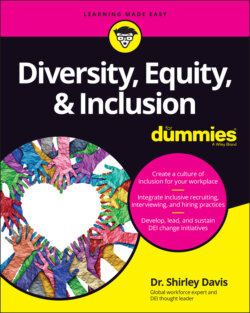Читать книгу Diversity, Equity & Inclusion For Dummies - Dr. Shirley Davis - Страница 24
Implicit bias
ОглавлениеBias is a tendency or inclination that results in judgment without question. Often, biases are unreasoned and based on inaccurate and incomplete information. Everyone has bias. It’s part of the human makeup; you need bias to protect you from danger. Biologically, people are hard-wired to prefer people who look like them, sound like them, and share their interests. But when left unchecked, biases can have a negative impact in every interaction.
Implicit bias (also referred to as unconscious bias) is an unconscious opinion, positive or negative, that you have about a group or person. Implicit biases are the attitudes or stereotypes that are taught and developed early in life, and they strengthen over time, affecting your understanding, actions, and decisions without your knowing it.
With the vast amount of diversity that makes up the global workforce — including more women, people of color, LGBTQ people, veterans, introverts and extroverts, immigrants, people with different abilities/thinking styles/personalities, and people from five generations, to name a few — the level of complexity and potential conflicts that can arise from unconscious bias is sure to increase. Leaders make decisions in the workplace every day, from sourcing to promotions to creating business strategy and beyond. Whether they recognize it or not, implicit bias enters into every one of these decisions.
To find out more about implicit bias, as well as other types of biases and how you can deal with them, head to Chapter 15.
